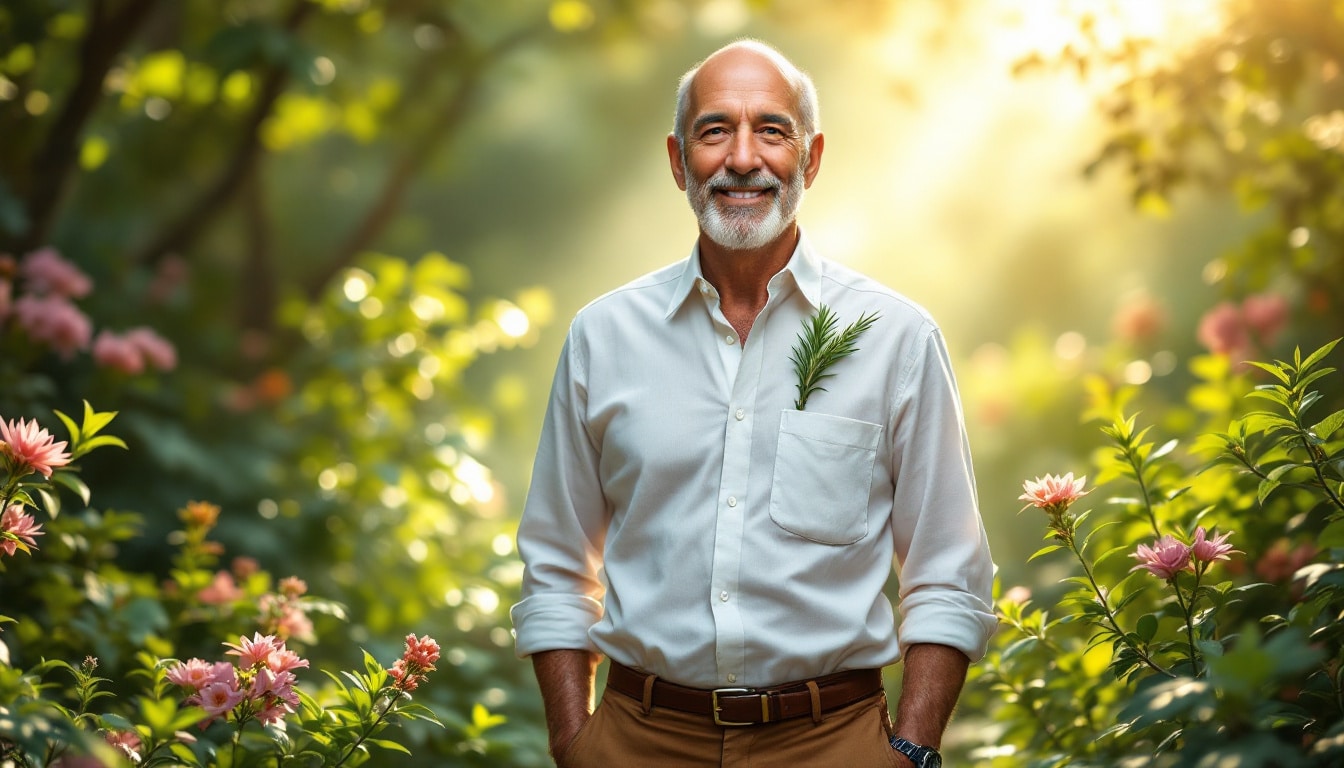As the tapestry of human life evolves, so too does our understanding of aging and the diverse factors influencing it. The quest for longevity has sparked a wave of innovative approaches that delve not only into the biological aspects of the aging process but also into holistic interventions aimed at enhancing quality of life. From groundbreaking technological advancements in geriatric care to revolutionary insights in anti-aging treatments, the conversation surrounding aging has expanded beyond mere preservation to celebrate a vibrant, fulfilling existence in later years.
This exploration unveils a spectrum of solutions that aim to support individuals as they navigate the complex landscape of aging. We will examine various interventions, from digital health innovations empowering older adults in their well-being journey to dietary insights that may contribute to cognitive resilience. As we peer into the future, it becomes increasingly evident that a multifaceted approach, incorporating the latest scientific research, community perspectives, and technological advancements, is essential for fostering a society where aging is not merely endured but embraced with enthusiasm and vitality. Through this lens, we invite you to uncover the paths that lead to a more enriched and sustainable experience of aging.

The pace of aging is accelerating globally, with the United Nations projecting that by 2050, the number of older individuals will reach 2.1 billion, a significant increase from 703 million in 2019. This demographic shift necessitates a deeper understanding of innovative approaches aimed at promoting healthy aging. Various interventions, ranging from technological innovations to lifestyle modifications, are emerging to shape how societies perceive and manage the process of growing older. We will explore these interventions, presenting data, case studies, and actionable strategies to promote a fulfilling and longer life.
Table of Contents
ToggleTechnological Innovations in Geriatric Care
Advanced technology is redefining the landscape of geriatric care, offering innovative solutions that enhance the quality of life for older adults. One notable intervention is the rise of telehealth services, which gained remarkable traction during the COVID-19 pandemic. Research indicates that telehealth can significantly improve access to healthcare, with a systematic review highlighting that e-health interventions notably boost health outcomes for older patients (PMC).
In addition to telehealth, wearable technology has emerged as a practical solution to monitor health metrics proactively. Devices such as smartwatches now allow users to track essential vitals like heart rate and activity levels. Furthermore, studies report that utilization of such wearable devices results in up to a 40% increase in physical activity among seniors, a crucial factor for maintaining cognitive health and physical function.
Moreover, digital home care solutions that leverage artificial intelligence (AI) assist in daily routines, providing reminders for medication intake or doctor appointments. A study exploring older adults’ perspectives on these digital tools found that 63% of participants felt empowered and reported enhanced autonomy in managing their health, showcasing the potential of technology to bridge the gap in geriatric care.
Interventions to Combat Cognitive Decline
Cognitive decline remains a pressing concern as people age, with conditions like dementia affecting millions globally. Fortunately, innovative interventions are paving the way to better cognitive health. Among these is the incorporation of cognitive training programs, which have yielded promising results in improving memory and executive function in older adults.
A meta-analysis reveals that participants in structured cognitive training showed a 23% improvement in cognitive performance compared to control groups. Additionally, lifestyle modifications, including engaging in regular physical activity and pursuing social connections, are linked to reduced risks of cognitive impairment. Programs focusing on collective group activities, such as community gardening or book clubs, enhance social engagement, which is essential for mental well-being.
Furthermore, dietary interventions are showing efficacy in combating cognitive decline. The Mediterranean diet, rich in antioxidants and healthy fats, has been associated with a 25% lower risk of Alzheimer’s disease. This nutritional approach opens the door to holistic interventions that can be embraced by individuals aiming for a longevity-focused lifestyle.
Future Perspectives on Aging and Longevity
As we delve into the future, the concept of aging may be redefined by advancements in genetic research and regenerative medicine. Researchers, such as Michael Rose, are exploring the genetic mechanisms behind aging with a view to developing targeted therapies that may delay the aging process itself (Upper Longevity). The potential for anti-aging treatments lies in understanding the biological clock—the telomeres, which dictate how cells replicate and consequently age.
Emerging therapies, including senolytics that selectively eliminate senescent cells, represent the forefront of anti-aging research. Preliminary studies suggest that these therapies may not only enhance lifespan but also improve healthspan, the period during which individuals remain healthy and functional. This dual focus on lifespan and healthspan could perhaps redefine what it means to grow older.
Moreover, societal attitudes towards aging are shifting as a result of these innovations. Increasingly, communities are embracing older adults’ contributions, promoting intergenerational partnerships that bolster wisdom-sharing and social cohesion. The success of programs such as “Age-Friendly Cities,” where urban environments are redesigned to support healthy aging, indicate a positive shift towards inclusive practices that encourage active participation of older individuals in society.
The environmental aspect of aging cannot be overlooked, with a push towards creating green environments enriched by nature. Studies show that older adults living in biodiversity-rich areas experience lower incidences of depression and anxiety. As we explore solutions for the future, integrating green spaces in urban planning can provide restorative benefits that enhance quality of life for all ages.
In summary, unpacking the multifaceted dimensions of aging reveals a tapestry of innovative interventions ready to be leveraged for successful aging. Whether through technological advancements, nutritional approaches, cognitive training, or societal reinterpretation, each strategy contributes uniquely to fostering longevity. The changing narrative surrounding aging encourages a proactive approach, one that invites individuals to embrace health, wellness, and fulfilment for the long run.

FAQ on Innovative Approaches to Aging
What are innovative approaches to aging? Innovative approaches to aging encompass a range of interventions and solutions designed to promote successful aging, enhance well-being, and extend lifespan. These can include technological advancements, lifestyle changes, and therapeutic strategies.
How can technology aid in the aging process? Technology plays a vital role in many aspects of aging by offering digital solutions for home care, telemedicine, and tracking health metrics, thereby improving the quality of life for older adults.
What interventions are most effective in promoting healthy aging? Several interventions such as regular physical activity, balanced nutrition, mental stimulation, and social engagement have been identified as essential for maintaining health during the aging process.
How do anti-aging supplements contribute to longevity? Anti-aging supplements may provide benefits by promoting cellular health, enhancing metabolism, and supporting the body’s natural defenses against aging-related deterioration.
What role does diet play in the aging process? A well-balanced diet rich in essential nutrients, including antioxidants, omega-3 fatty acids, and vitamins, is crucial for maintaining overall health and can influence the aging process positively.
What is the significance of understanding healthspan versus lifespan? Understanding the difference between healthspan (the period of life spent in good health) and lifespan helps in devising strategies to improve quality of life as individuals age, aiming for a longer healthspan rather than just a longer lifespan.
What is the potential of regenerative medicine for aging? Regenerative medicine holds immense potential in addressing aging by repairing damaged tissues and organs, potentially reversing some aspects of the aging process and restoring function.
How can social interactions impact aging? Social interactions are crucial for mental and emotional well-being, promoting a sense of community and belonging, which can ultimately lead to better health outcomes and longevity.
What innovations are currently being explored in geriatric care? Innovations in geriatric care are focusing on personalized medicine, digital health solutions, and interdisciplinary approaches to provide comprehensive care tailored to the unique needs of older adults.





